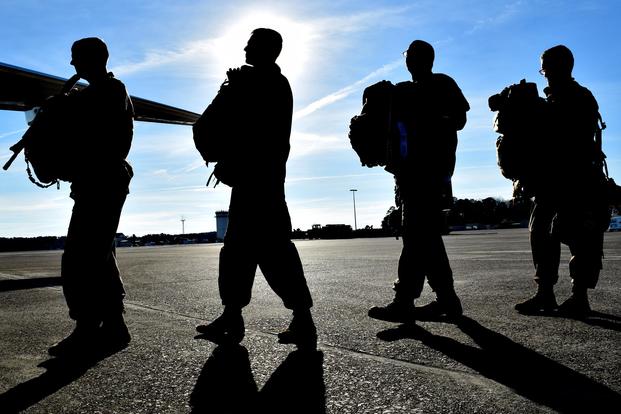A planned 3.1% military pay raise is safe, but wrangling will continue over the shape of the defense budget on issues ranging from nuclear weapons and the Space Force to the border wall and Guantanamo Bay, Rep. Adam Smith, D-Washington, chairman of the House Armed Services Committee, said Monday.
"I'm not going to throw out red lines at this point" against compromise in the legislative jockeying to come, he said at a breakfast with defense reporters. At the same time, he appeared adamant about cutting $17 billion from the administration's request of $750 billion for defense in fiscal 2020.
"I think we need to have spending discipline within the Pentagon," and slimming the defense budget to $733 billion is a good place to start, Smith said.
By giving the Pentagon more than $733 billion, "I think we encourage inefficiency," he said.
"It's the number we have been planning on for better than a year, and I intend to make that argument."
The Senate Armed Services Committee last month signed off on the full $750 billion.
In his remarks at the breakfast, and in outlining his vision for the defense budget in what is called the "Chairman's mark," Smith said he agreed with his Republican counterparts on most of what's in the budget proposals, including the 3.1% pay raise.
"We have to remember that the overwhelming majority of this bill is incredibly important and not that controversial," he said. "It funds a lot of crucial military construction projects to keep us moving forward on the improvements we've made on readiness."
In addition to the proposed 3.1% pay raise, there's widespread agreement on funding for 11 new Navy ships and a tenant's bill of rights for military families, Smith said.
One issue the committee plans to sidestep is the Trump administration's implementation of restrictions on transgender people serving in the military. Several lawsuits are ongoing regarding a limiting policy that many have characterized as a ban.
"We're not going to do anything in the committee" on transgender troops, Smith said. He added that he expects House Democrats will have a proposal on the floor for lifting the restrictions.
The areas of disagreement begin with the Space Force, a particular favorite of President Donald Trump. The initial version of the defense policy bill, the first put forward by Democrats since taking over the House in 2018, did not include language on setting up a Space Force, but Smith said an amendment will do that later this week.
"We're not actually walking away" from Space Force, he said, adding there is an agreement that Space Force will be included in the full committee markup.
However, Smith said the military service for space is "going to be smaller and more focused, in our view," than the Air Force has proposed.
"I think the Air Force has not done a particularly good job in managing space," he said, adding "I don't trust the Air Force on its own" to come up with a solid plan for setting up Space Force.
On nuclear weapons, House Democrats have proposed doing away with a plan to deploy the W76-2, a low-yield, submarine-launched missile that was recommended by the Nuclear Posture Review endorsed by former Defense Secretary Jim Mattis. The missile has already entered production.
"What we propose in our mark really isn't that dramatic, in my opinion," on nuclear weapons policy, Smith said. "The most dramatic thing probably is the low-yield nuclear weapons. Other than that, we're not having a huge fight, despite what you may have heard from our Republican colleagues."
In a joint statement last week, Rep. Mac Thornberry, R-Texas, the ranking HASC member, and Rep. Mike Turner, R-Ohio, ranking member of the subcommittee on strategic forces, rejected the Democrats' proposals on nuclear forces.
They said the Democrats' proposal "hinders our ability to defend ourselves, weakens our ability to deter our adversaries, and therefore enables them to challenge us."
On Guantanamo, Smith predicted partisan battling over the Democrats' plan to bar the Defense Department from accepting new detainees. The Democrats would also deny the White House request for $88 million to build a new detention facility.
Smith said he also expects prolonged debate over the Democrats' proposals to deny the White House DoD funds from the Overseas Contingency Operations budget or military construction funds for the southern border wall.
The Democrats' plan would nix the White House plan to take $7.2 billion from the OCO budget and use it for the border wall, and would also include a "blanket prohibition on military construction funds for the construction of a border wall, fence or physical barrier along the southern border."
-- Richard Sisk can be reached at Richard.Sisk@Military.com.












